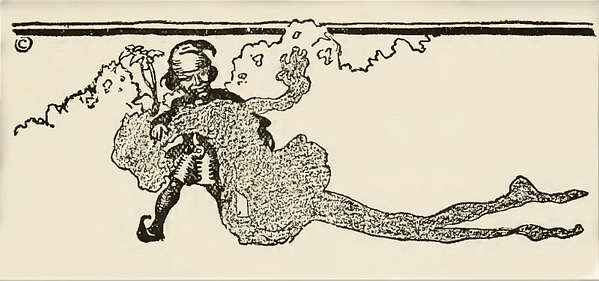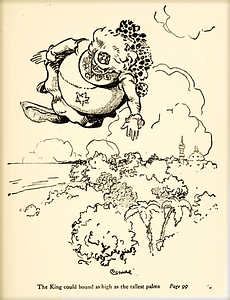The King of Gee-Whiz stepped out into an open space in the forest, and, to his very great surprise, observed that he could not feel his feet touch the ground. This was really because he was so full of rubber, although he himself had no idea of any such thing at all. He was conscious only of feeling that he had all along been a greater King than he had had credit for being. So he hummed a tune to himself as he began to dance.
There was probably never a dance just such as this which the King of Gee-Whiz now began. Had he himself seen it from a distance, he would have been sure that it was not the performance of a dignified and respectable King. He sprang from one foot to the other, and each time he touched the ground he rebounded into the air a dozen feet, or possibly even more. He alighted upon both feet, muttering as he did so an exclamation of delight, for, strange as that may seem, he was enjoying himself very much. Each time that both his feet struck the ground he went into the air just twice as far as when only one foot was so employed. He slapped his arms upon his chest, and as he did this, to his great surprise, a squeak came out of his mouth exactly similar to that which comes from the hole in a rubber ball when you squeeze it. This startled him at first, but he was too busy to think about it long.
He sprang from side to side; and whereas in a common dancing step a King goes scarcely more than two or three feet at a stride, the King now would step at least a dozen feet, or, for that matter, perhaps twenty. There seemed to be no limit to the length of the steps he could take; and whenever he took a step he bounded high into the air, at times having difficulty in keeping himself from turning quite over in the air. Indeed, the temptation to turn hand-springs and somersaults as he had done when a boy became so strong upon him that only his great kingly dignity served to prevent his doing that very thing.
“Aha!” cried the King, “this certainly is fine.” At least these are the words which he wished to say, although all that he could hear were several sharp whistles as the breath came out of his mouth.
The King sprang up and down very hard, anxious to see how high he could go into the air. To his great surprise, he found that by making several leaps up and down he could easily bound upward as high as the top of the tallest palms. This pleased him very much, as in this position he secured a wider view of his own possessions than he had ever had in his life before.
“I shall come back here once in a while,” said the King to himself, “and have another drink at that rubber tree, if this dose wears off after a while. This really is wonderful. It enlarges my outlook upon life many-fold, and although I have previously to this felt very much of a King, I now begin to understand how much I have underrated my own abilities in every line of activity. But, by the way,” he added to himself, “this exercise is affecting the royal appetite. I think I’ll step over and have my breakfast.”
So in one or two long strides he walked over to the palace and called aloud to his Private Secretary and to the Widow Pickle. To his great surprise, when he called aloud, the King could not speak a word, but could only whistle. He put up his hand to his face to feel what was the matter with his voice, but of course he could not feel anything about his voice. He did, however, observe, very much to his annoyance, that his royal aquiline nose had quite disappeared, that his mouth now extended quite across his face, that his ears were small and almost gone into his head, and that for a forehead nothing remained but a wide, round expanse, which he could easily dent with his thumb. In short, he resembled, to the touch at least, although, of course, he could not see himself, nothing in the world so much as a large, soft, rubber ball, hollow and inflated, and with legs and arms attached.
When the King realized this and found also that his voice was gone, a sudden fear fell upon him. “My soul and body!” thought he to himself, “can this be true? If so, I am in the worst sort of a situation, for no one will recognize me!” So saying, he sank down upon the ground near the palace door, and after a number of bounces up and down at last settled into an attitude of Deep Thought.
After the King had thought for quite a time, he happened to look upon the ground before him. To his great surprise, there was no shadow there. He had not known that all along it had been the intention of the Wicked Fairy to steal his shadow. Such, however, had been the case. While the King was at the top of one of his highest bounds, the Wicked Fairy, who had remained upon the ground below, took the opportunity to remove his shadow from beneath him; so that after that the King cast no shadow at all. Just how this was done it is hard to say. Perhaps the Chemist, Aurelius Pickle, who knew many strange things, could have told how this occurred, but he, being dead, could not be asked. It may be that as the King was stretched out to thrice his natural height, he was thrice his natural thinness, and that the shadow also became three times as thin, and so was easy to take away. In any case, certainly the Wicked Fairy had removed the King’s shadow, and, of course, with it the White Cricket which had always lived in that shadow. When the King looked down and saw what had happened, he fell back in a deep swoon of terror.
For a moment all was still; then there came from somewhere off in the distance, the doleful tones of the Enchanted Banjo.
THE SORROWFUL SONG OF THE SHADOWLESS KING
If you find my shadow, O bring it straight to me!
A shadowless King is compelled to be gloomy;
I sit in the sun and I sob in my sorrow
And wonder if I'll have a shadow to-morrow.
I've lost my shadow;
My heart is sad, O!
I would be glad, O!
If I but had, O!
My shadow.
I look in the corners, I hunt through my palace;
I grieve that my shadow was stolen through malice—
Just think, if you please, of a life sad and hollow!
When I take a walk there's no shadow to follow.
I've lost my shadow;
It is too bad, O!
It makes me mad, O!
To think I had, O!
My shadow.
My shadow was ever a thing of great beauty;
It did all I did, as was its bounden duty;
It echoed my sitting and standing and walking,
My riding and ruling, and all but my talking.
I've lost my shadow;
It makes me sad, O!
I would be glad, O!
If I but had, O!
My shadow.

